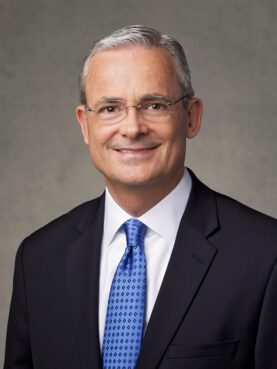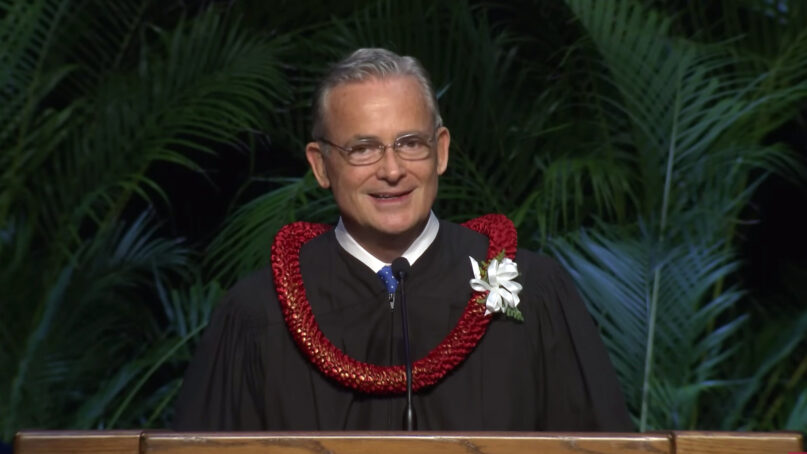(RNS) — I was happy to hear that the Church of Jesus Christ of Latter-day Saints ordained a new member of the Quorum of the Twelve Apostles. The normal course of events is that the Church would wait until the next General Conference before filling a vacancy in the Quorum. In this case, though, historian Patrick Mason called it accurately when he predicted that President Nelson would likely upend tradition and call a new apostle by the end of this calendar year.
And speaking of smart people named Patrick, the new apostle who is replacing the late Elder M. Russell Ballard is Patrick Kearon, a 62-year-old Brit who has been a general authority since 2010. Most recently, he’s been serving as the senior president of the Seventy.
In some ways, Elder Kearon is a predictable choice, and in others, he’s really a breath of fresh air.
On the side of predictability, he has come up through the ranks of the Seventy, including its presidency. Several other current members of the Quorum of the Twelve also served in the presidency of the Seventy immediately before being called as apostles, including Ronald Rasband, Todd Christofferson, Quentin Cook, Neil Andersen and Dieter Uchtdorf.
Not all leaders of the Seventy become apostles, but it’s a proven training ground.

Elder Patrick Kearon of the Quorum of the Twelve Apostles. (Photo © 2023 by Intellectual Reserve, Inc. All rights reserved.)
Elder Kearon is also the “right” age, or at least the age that current apostles were when they were called. Ulisses Soares was just shy of 60, Gerrit Gong 64, Dale Renlund 62, Gary Stevenson 60, Ronald Rasband 64, Neil Anderson 57, Todd Christofferson 63, Quentin Cook 67, David Bednar 52, Dieter Uchtdorf 63, Jeffrey R. Holland 53. By being called at age 62, the new apostle is almost exactly in that sweet spot (the median age at which the other apostles were called is 60.4).
So he’s the right age, with the preferred leadership background. The fact that he’s not American is something for the plus column. For too long, this has been an American church with global outposts, rather than what it claims to be: a world religion. During the five and a half years of President Nelson’s tenure, this has begun to shift. He has appointed three apostles, two of whom (Elders Soares and Kearon) are international picks, while the third (Elder Gong) is Asian American. With all three choices, President Nelson has signaled a desire to expand the Church’s story and reach.
Compare this with 2015, when President Monson had the unusual opportunity to appoint three new apostles all at one General Conference, and all three turned out to be white guys from Utah. I’m sure all three were qualified, but so were many others. The combined effect was disappointingly provincial, which one non-American member described to me as a slap in the face.
With Elder Kearon’s appointment, we’re still nowhere near where we need to be in terms of representation. We have no African or Asian apostles, and only one from South America, yet those continents are often where the Church is still growing. (Elder Kearon’s home base of England has been a tough market for the Church in recent years, with few converts and high rates of inactivity for baptized members. One stake was discontinued earlier this year, with rumors of more consolidations to come.)
Although his presence doesn’t alleviate the Anglo-heavy tilt of the Quorum, Elder Kearon brings a dose of globalism to the mix of the still mostly American apostles, especially because some of his work has focused on helping refugees around the world. In 2016, he used a General Conference talk to educate Latter-day Saints about the global refugee crisis, reminding listeners of our own history as a persecuted people who should be first in line to help others when they’re displaced from their homes. He insisted at the time that this statement was not political — but since it was delivered one month before an election, during a campaign in which Donald Trump had repeatedly demonized immigrants, some of whom were refugees, it couldn’t help but be political.
Elder Kearon preached truth and compassion anyway, and I was grateful. It was a balm to my soul to hear a church leader point to those realities and how we might help.
I also relate to him as a fellow convert. Like me, he joined the Church in his twenties. I think it’s helpful to have a balance of converts and “BIC” leaders (born in the covenant), as each group brings different gifts and perspectives to the table.
One way Elder Kearon might contribute as a Church leader is in his professional capacity as someone with a career in public relations. The Church needs a lot of help in this area. Just this week, the investigation into the Church’s “help line” for bishops who are reporting sexual abuse revealed some fresh horrors in the form of audio recordings that expose “the risk management playbook that has helped the church keep child sexual abuse cases secret.” And the unsavory Tim Ballard story refuses to go away; Utah Attorney General Sean Reyes is the latest in a line of former Ballard supporters who now say they believe his accusers. Reyes will not run for re-election when his term expires in just over a year.
Elder Kearon could help the Church move into a less defensive public relations posture — away from the knee-jerk “deflect and deny” reactions it has defaulted to in the past and toward something less entitled and pompous. (We Mormons spend a lot of time wondering why we’re one of the least liked religious groups in America. Part of it is that we are tiny and most people just don’t know much about us. But perhaps another part is the Church’s own troublesome assumption that it is always in the right.)
Elder Kearon appears to have the sort of genuine humility that would go a long way toward building bridges with other religions and people around the world.
KSL news is reporting that immediately after his ordination as an apostle, he apparently hopped on a plane to Hawaii, where he’d been scheduled to speak at a BYU-Hawaii commencement ceremony.
I appreciate the quiet decency he showed in his remarks, speaking candidly about how he never imagined, when preparing his commencement address, that he would be giving it on the same day he had been called as an apostle. “It’s staggering to me even just to say that,” he admitted.
To be an apostle, he said, is to be “a special witness of the Lord Jesus Christ. I’m keenly aware that I will need to grow in every conceivable good way to become the servant the Savior needs me to be.”
Sounds like good advice for all of us, actually.
Related content:
Remembering LDS apostle M. Russell Ballard
Naming of 3 new Mormon apostles raises questions of race, international diversity (2015)






